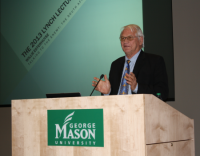25th Annual Lynch Lecture Reflections
25th Annual Lynch Lecture Reflections
The School for Conflict Analysis and Resolution was delighted to welcome Dr. Willie Esterhuyse to give the 25th Annual Lynch Lecture, “Talking to the Enemy: The South African Case Study” on October 24th, 2013. George Mason University’s Founders Hall Auditorium was filled with students, staff, faculty, and members of the public to hear Dr. Esterhuyse, a leading South African writer, philosopher, and intellectual, speak on his role in facilitating dialogue between the African National Congress (ANC) and the then South African government.  Dr. Sandra Cheldelin, the Vernon M. and Minnie I. Lynch Professor of Conflict Resolution at S-CAR, began the introductions with a mention of the Lynch Lectures, an annual lecture series in honour of Edwin and Helen Lynch, whose generosity to S-CAR includes the beautiful Point of View property on Mason Neck and the endowed Chair in the name of Edwin’s parents. Dr. Cheldelin emphasized the importance of the lecture series in bringing the idea and theory of conflict analysis and resolution to the attention of the wider community.
Dr. Sandra Cheldelin, the Vernon M. and Minnie I. Lynch Professor of Conflict Resolution at S-CAR, began the introductions with a mention of the Lynch Lectures, an annual lecture series in honour of Edwin and Helen Lynch, whose generosity to S-CAR includes the beautiful Point of View property on Mason Neck and the endowed Chair in the name of Edwin’s parents. Dr. Cheldelin emphasized the importance of the lecture series in bringing the idea and theory of conflict analysis and resolution to the attention of the wider community.
Dr. Johannes Botes, Associate Professor at the School of Public and International Affairs at the University of Baltimore, spoke next. He told of being a student under Dr. Esterhuyse at the University of Stellenbosch, and of his experience as a member of the first doctoral class at S-CAR. As well as the 25th year of Lynch Lectures, 2013 marks the 25th celebration of the doctoral program at S-CAR.
Dr. Christopher Mitchell, Professor Emeritus of Conflict Analysis and Resolution at S-CAR, gave the final introduction. Before welcoming Dr. Esterhuyse to the stage, Dr. Mitchell introduced clips from ‘Endgame,’ a 2009 film that dramatizes the final days of apartheid in South Africa. Played by William Hurt, Dr. Esterhuyse’s contribution to these secret negotiations between the ANC and the government was unmistakable. These negotiations were fundamental in the end of apartheid policies, the eventual release of Nelson Mandela, and the interim constitution that provided the basis for full democracy in South Africa.
Finally, and with much audience anticipation, Dr. Esterhuyse took the podium. He told a story of the crucial importance of banishing bitterness and building trust. Describing the challenge of the negotiations, Dr. Esterhuyse depicted the suspicion and antagonism between the two parties and spoke of hard decisions about confidentiality, deniability and responsibility to accept outcomes. He emphasized the importance of deconstructing the idea of ‘the enemy’ and rehumanising the other. Dr. Esterhuyse concluded with a discussion on the justice gap in contemporary South Africa and the importance of addressing this gap. Stressing the need for redistribution of wealth, broad and deeper democracy, job creation, and economic growth, Dr. Esturhuyse underlined the inequalities within post-apartheid South Africa and the fundamental need for social cohesion, nation building, and positive peace




